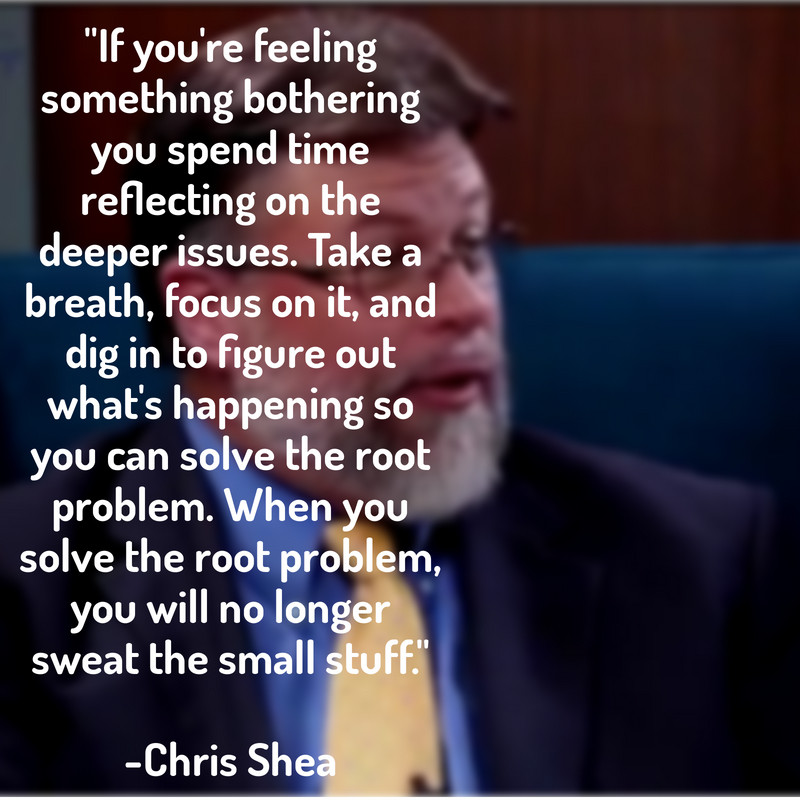
How To Not Sweat The Small Stuff And Find Happiness
Learning to not sweat the small stuff is a phrase filled with much wisdom. The important piece to this statement is learning to live in the moment. But how can we learn to stay more in the moment so that we don’t let the little things bother us so much that we lose our happiness? Here is my technique on how to not sweat the small stuff.
Step one is to actually reframe the question of how not to sweat the small stuff. If something is bothering someone, then it’s not “small stuff” to them. Judging another’s perception as to the gravity of a situation negates what they’re feeling and expressing. Although, I do hope to eventually get them to a point in the future where they can laugh at it and say, ah, that really was small.
But, to not sweat the small stuff, to get to the point of recognizing the smallness of some of our concerns, the question I’ll ask the client is “in the scope of everything going on in your life and in the world today, where does this issue fit?” If they’re honest with themselves and with me, they’ll understand the inner challenge in that question. Placing our perceived large stressor in judgment against the stressors of the world gains us a new perspective on our place within the larger community.
To clarify, I don’t typically advocate comparing one person’s troubles to another person’s troubles since we all cope in different ways, even to the same stressors. But in cases when an issue which is seemingly small yet perceived as large, then changing one’s perspective through comparison can be eye-opening and therapeutic.
When we sweat the small stuff and get stuck in our focus on anxiety, we need a strategy to guide us in healthy non-anxiety producing coping skills. The approach I use is what I affectionately call “the shiny object” strategy.
This strategy diverts our attention to focus on something different from that which is producing our anxiety, similar to shaking a shiny object in a dog’s or baby’s face to divert their attention to something else. Eventually, while diverted, we forget that which were focused on and which was causing the anxiety. This exercise guides us to reframe our perspective on ourself and our world.
Bonus: Download Chris Shea’s booklet on Life Coaching & is it for me? Click here to get it
I’ve spent a couple of decades working with people suffering from the disease of addiction, and one of their complaints to me is how their fellowship sponsor responds to them when they share they have a craving. They tell me they would call their sponsor and say, “I have a craving to use.” Invariably the sponsor would reply with something to the effect of, “Hey, did you watch the game last night?” The conversation would turn to sports, or whatever topic the sponsor wished to discuss. But it was invariably any topic other than the issue of the person’s craving to use a drug or drink.
My clients would complain that the sponsor isn’t helping when they reach out with a craving. They complain that the sponsor will talk about everything except for the reason they called, their craving. My question to the client, when they were done complaining, is always “did you use? Did you give in to the craving?” The client would always answer with one word, “no.” Isn’t that the goal the client wanted? They didn’t want to give in to their craving, and in the end, they didn’t.
This is a prime example of the shiny object theory. Keep focusing on your craving, and the craving will increase in intensity; stop focusing on your craving, and shortly, it will go away. In the same way, if I have a headache and I’m focused on my headache, my headache gets worse. If I have a headache but take care of that headache and return to my day’s activities, my headache seemingly goes away.
If someone decides to sweat the small stuff, remember that to them the issue they are sweating is not small. There is a reason they are sweating the issue, so don’t focus solely on the issue itself, rather, spend the time to learn why the issue is bothering the person the way it is.
If you’re feeling something irritating you, annoying you, bothering you, sticking with you, spend time reflecting on the deeper issues. Take time out, take a breath, focus on it, and dig in to figure out what’s happening so you can solve the root problem. When you solve the root problem, you will no longer sweat the small stuff.
{loadmoduleid 140}
